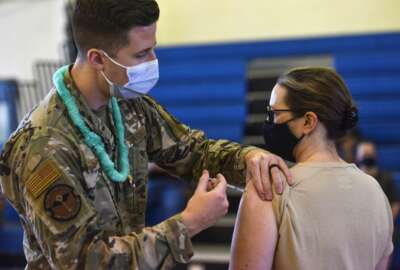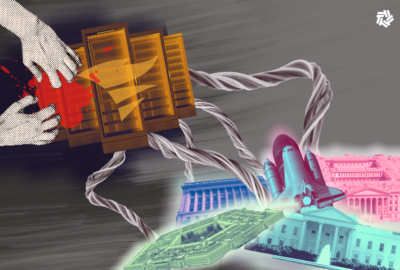To listen to the Federal Newscast on your phone or mobile device, subscribe in PodcastOne or Apple Podcasts. The best listening experience on desktop can be found using Chrome, Firefox or Safari.
- The Pentagon’s inspector general gave high marks to the Defense Department’s information technology response to COVID-19. The OIG spent months examining a sample of the more than $80 million DoD spent on new IT services after Congress passed the CARES Act. Auditors found the military services and Defense agencies paid reasonable prices, and stayed in line with DoD policies to keep cyber vulnerabilities in check.
- The pay premium flexibilities agencies got at the start of the pandemic last year are in effect through 2021. Congress extended a waiver on the usual premium pay caps in the last omnibus. It means agencies can disregard the usual limits on premium pay for any federal employees whose services are needed to help the government respond to the COVID-19 pandemic. The Office of Personnel Management says there’s still one limit though. An employee’s basic and premium pay can’t exceed $199,300 for the year.
- The Federal Labor Relations Authority is reestablishing its alternative dispute resolution office. The office helps the federal sector community resolve unfair labor practice cases and other appeals before the FLRA. It will offer training to help agencies and unions prevent conflicts that could otherwise turn into litigation before the authority. Newly-appointed FLRA Chairman Ernest DuBester says the program usually helps agencies resolve cases more quickly and with fewer resources.
- Employees at one federal agency have drastically different views of telework today. Over half of employees at the U.S. Consumer Product Safety Commission say they have a new outlook on telework today than they did before the pandemic. An overwhelming majority of those employees say their views on remote work changed for the better. The data comes from a survey of the workforce from the agency’s inspector general. A majority of supervisors say their employees are as or more productive today than they were before the pandemic.
- The General Services Administration took the next step in its efforts to modernize federal rule-making. GSA launched a new version of regulations.gov with the goal of making it easier to find new rule proposals and lodge comments about them. Associate administrator Krystal Brumfield says the new site has a better search function than the old one. And that it improves the integrity of commenting by using Captcha to filter out bot-generated comments. What GSA calls authorized entities will still be able to submit comments in bulk, and the identities of automated commenters will now be discoverable.
- The insider threat program at the General Services Administration is falling short of mandated requirements despite receiving full operational status from the National Insider Threat Task Force in 2017. GSA’s inspector general found the insider threat program does not effectively monitor risks from separated and terminated employees. Auditors say GSA does not consistently deactivate their IT accounts and recover and destroy their identity cards within required time frames. The IG made ten recommendations, including improving information sharing across the agency and establishing roles and responsibilities to ensure oversight of the employee separation and termination processes.
- The Biden administration’s cyber official says agencies are building back better after the SolarWinds breach. The SolarWinds compromise will take the Biden administration months to fully investigate. But so far, Anne Neuberger, the administration’s deputy national security advisor for cyber and emerging technology, says it compromised networks for nine agencies and about 100 private-sector companies. Neuberger says the cyber incident highlighted the investments the administration needs to make to increase network visibility and mitigate future cyber incidents. (Federal News Network)
- The Defense Health Agency is assuring members of the military and others that taking the coronavirus vaccine while pregnant is safe for women and babies. As of January 21, more than 15,000 pregnant patients have received a vaccine. No safety concerns have been reported. DHA says contracting COVID while pregnant is a much higher risk for mothers and babies. Pregnant people with coronavirus are three times more likely to be admitted to the ICU and need breathing support.
- The Defense Department says it will fully vaccinate its force by July or August, but there are some caveats to that estimation. Pentagon officials say about a third of service members eligible to get the coronavirus vaccine have declined the shot. The Defense Department says it will have administered a million vaccines to service members, civilians and families by the end of the week. Troops are not required to get the vaccine since it is under an emergency-use authorization. In the past week, DoD inoculated 170,000 people. The department says it needs to do a better job of educating service members on the safety of the shot. (Federal News Network)
- The Senate Homeland Security and Governmental Affairs Committee named new leaders to its subcommittees. Sen. Jon Ossoff (D-Ga.) will chair the permanent subcommittee on investigations. Sen. Ron Johnson (R-Wis.) will serve as its ranking member. Sen. Maggie Hasson (D-N.H.) will lead the emerging threats and spending oversight subcommittee, and Sen. Rand Paul (R-Ky.) will serve as ranking member. Sen. Kyrsten Sinema (D-Ariz.) will lead the government operations and border management subcommittee. Sen. James Lankford (R-Okla.) will serve as ranking member.
- The FDIC joins a growing number of agencies with a different kind of CIO. Sultan Meghji is the Federal Deposit Insurance Corporation’s new CIO, chief innovation officer that is. The agency named Meghji as the first ever FDIC executive to promote the adoption of innovative technologies across the financial services sector. He comes to FDIC from the private sector where he was CEO and cofounder of Neocova, a financial technology firm providing cloud and AI software for community banks and credit unions. As chief innovation officer, Meghji will work with public and private sector partners to help ensure the financial systems of the future are innovative, resilient and egalitarian.
Copyright
© 2024 Federal News Network. All rights reserved. This website is not intended for users located within the European Economic Area.



